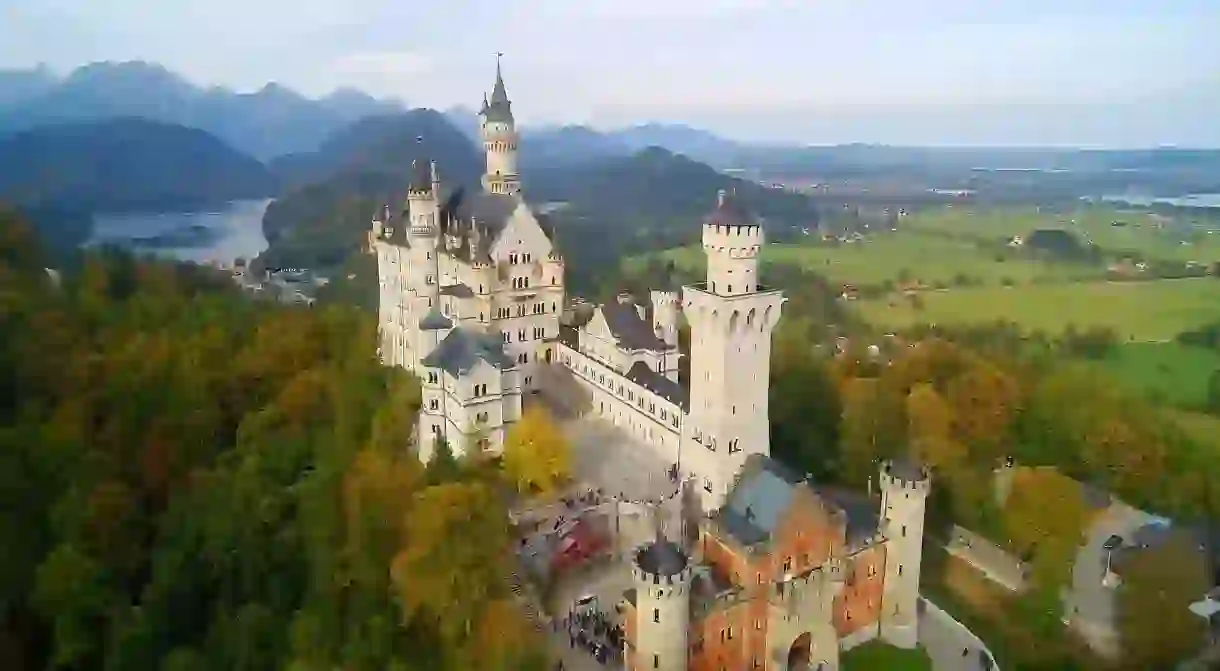The Story Behind Germany's Neuschwanstein Castle

With its magical silhouette of undulating towers, conical roofs, dazzlingly white limestone facades and prominent position high up on a rocky hilltop, Neuschwanstein Castle is a storybook image – a quintessential castle in the clouds.
Widely regarded as the original fairytale palace, Neuschwanstein has awed many millions over the centuries with its fantasy location and Romanesque Revival architecture. Set within a landscape of chocolate-box views, including Alpine foothills and magnificent forests, it’s impossible to avoid comparison to Walt Disney’s Magic Kingdom, and the iconic Disney Castle we all know so well.

The history of Neuschwanstein Castle
Commissioned in 1868 by King Ludwig II of Bavaria as a monument to German composer Richard Wagner, as with any fairytale, the story behind this castle’s creation is full of mystery and intrigue.
It’s a tragic tale of a handsome young prince with a passion for music, art and architecture, who ascended the throne as a teenager and ruled as a recluse until his untimely (and mysterious) death in 1886 at the age of 41.
During his lifetime, Ludwig II was denounced as a madman obsessed with beauty. Spending money he didn’t have on eccentric and ambitious building projects, Neuschwanstein was just one of many commissions ordered to enrich the cultural landscape of the nation.
His artistic, introverted nature was considered idiosyncratic for a king at that time and he was ultimately declared unfit to rule by his closest advisors. However, the plot to depose ‘The Mad King’ Ludwig led to suspicions surrounding his death and cast doubt on these assertions.
Once berated as a vanity project orchestrated by a man whose kingdom was slipping away from him, the palace is now firmly considered a national treasure. Ludwig II used his personal fortune and heavily borrowed gold to build the castle, rather than take from Bavarian public funds.
Having spent only 11 nights at the castle and sadly dying before its completion, Ludwig II’s creative vision lives on in thebuilding. The castle was opened to the public shortly after his death in 1886 and has since attracted more than 61 million visitors.
Is Neuschwanstein Castle the inspiration for Cinderella’s castle?
A close friend of the King’s, Empress ‘Sissi’ Elisabeth, described her dear Ludwig as ‘living in a world of dreams’. It’s no surprise then that it attracted another romantic dreamer, a century later.
Shortly before construction began on his eponymous Disneyland in the early 1950s, Walt Disney visited Neuschwanstein with his wife during a grand tour of Europe. A few years later, Cinderella’s castle was revealed in all its turreted glory.
Ludwig’s passion for fantasy and storytelling not only left a tangible legacy but ultimately influenced popular culture too, drawing many to Bavaria in search of the ‘real’ Disney castle.
When to visit Neuschwanstein Castle
The castle is perfectly picturesque at any time of year, whether you’re visiting in the depths of winter to see snow-capped turrets, or springtime when the foliage is bursting into life.
To beat the crowds, plan your visit in low season (November to April, excluding Christmas) when the castle will be quieter. Though a visit made in the dead of winter will be a cold one, you will be rewarded with heart-stopping views of a frosty Neuschwanstein – but bear in mind that transport becomes tricky at that time of year, and getting around can be hard work.













